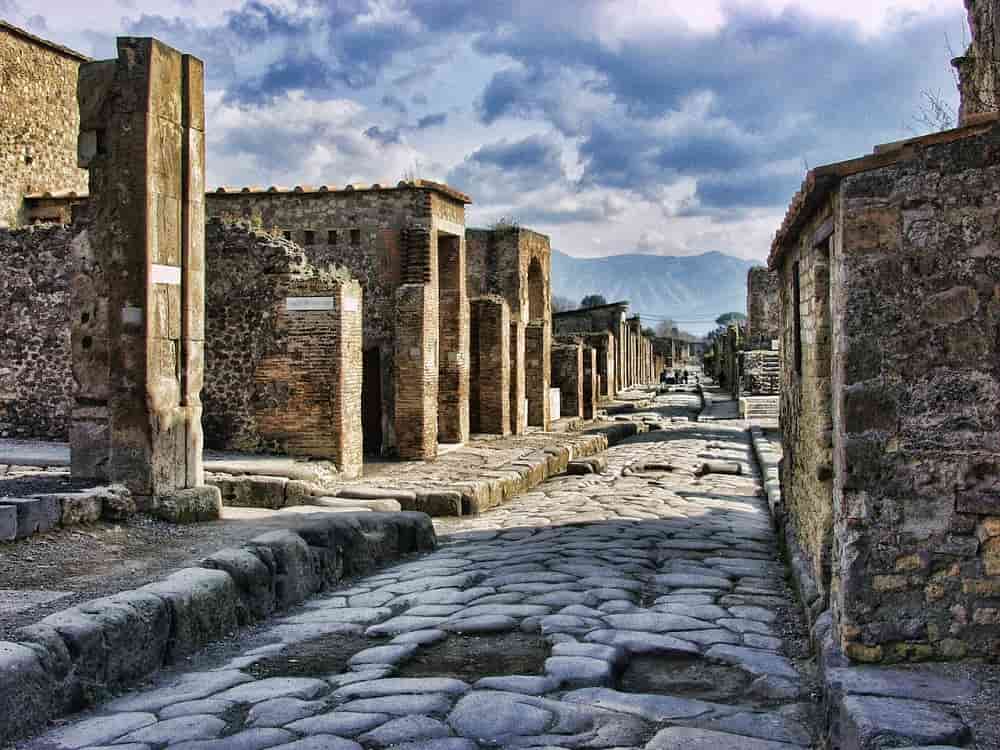Nestled near the enchanting city of Naples, Italy, lies the world-renowned archaeological wonder, Pompeii. This ancient Roman metropolis suffered a catastrophic fate, as it was mercilessly engulfed and concealed beneath layers of scorching volcanic ash and pumice when the formidable Mount Vesuvius erupted with fiery wrath in 79 AD. For countless generations, Pompeii's existence faded into obscurity, its secrets entombed within the earth's embrace, until the remarkable resurgence of its long-lost splendor in the illustrious 18th century.
In the scorching August sun of the year 79 CE, right around the stroke of noon, Mount Vesuvius unleashed its wrath in a cataclysmic eruption. A colossal explosion sent a torrent of volcanic debris cascading down upon the unsuspecting city of Pompeii. As if that weren't enough, the very next day, the heavens themselves seemed to conspire against the doomed city, belching forth clouds of scalding, searing gases that would spell its tragic fate.
Amidst this relentless fury, buildings crumbled to dust, their once-proud structures reduced to mere memories. The hapless populace, caught in the unforgiving grip of nature's wrath, met their tragic end, either crushed beneath the weight of collapsing edifices or suffocated by the choking embrace of volcanic ash. As the tempest raged on, Pompeii, once a thriving city, was condemned to an eerie and silent burial beneath a blanket of ash and pumice, forever sealing its tragic fate.
For many centuries, Pompeii slumbered beneath its protective veil of volcanic ash," which flawlessly safeguarded the ancient remnants. When these treasures were finally unearthed during the 1700s, the global community stood in awe, confronted with the revelation of an advanced Greco-Roman city, seemingly suspended in the sands of time. Among the prominent civic structures were a magnificent forum and a sprawling amphitheater. Furthermore, opulent villas and a diverse array of residences, harkening back to the 4th century BCE, were revealed in all their splendor.
Read:-Hy-Brasil - A Legendary Phantom Island That Appears Once In Every Seven Years
Within the city's confines, archaeologists uncovered poignant glimpses of the past. Some individuals were found, their remains preserved, as they sought refuge from the cataclysmic eruption. Others met their fate in the act of escape, forever entombed in their flight. Remarkably, bakeries stood frozen in time, their ovens still cradling loaves of bread, baking as they were on that fateful day. These edifices, along with their invaluable contents, unveiled the ordinary existence of the bygone era, igniting a profound fascination for classical antiquity in the 18th century.
Pompeii bestows an unparalleled window into the quotidian existence of ancient Rome. The volcanic ash and debris, acting as a time capsule, have astoundingly preserved the city remarkably well, including its buildings, streets, and even some of its inhabitants who were caught in the disaster. In the quest for understanding, archaeologists have unearthed an abundance of artifacts, frescoes, and mosaics, each providing invaluable glimpses into the culture, architectural marvels, and societal fabric of the mighty Roman Empire.
In the present day, Pompeii stands as one of Italy's foremost tourist destinations, magnetizing multitudes of globetrotters hailing from every corner of the globe. They embark on a journey to immerse themselves in its opulent history and encounter the uncanny sensation of traversing through an age-old city suspended in an eternal moment. It stands as an enduring testament to the supremacy of nature and underscores the imperative of safeguarding our cultural legacy.
Those who venture to Pompeii have the opportunity to delve into its remarkably intact remnants. These encompass the Forum, the Temple of Apollo, the House of the Vettii, and the renowned plaster casts of human figures caught in their final moments. The city's poignant destiny has elevated it to an emblem of elemental cataclysms and a distinguished UNESCO World Heritage Site.














0 comments:
Post a Comment